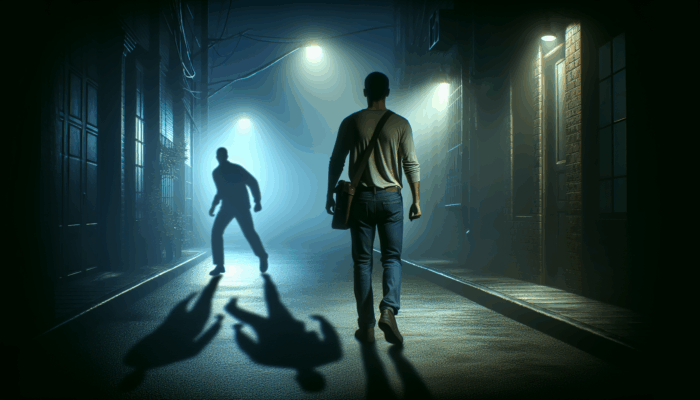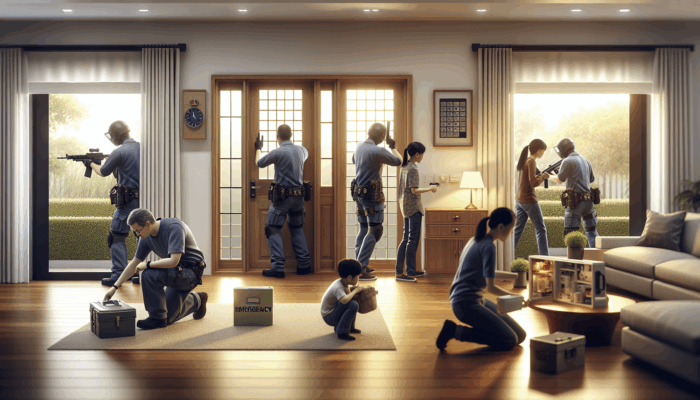Enhance Your Home Security Through Preparation
Being prepared is your first line of defense regarding how to stay calm during a home invasion. The chaos of an unexpected intrusion can provoke panic, but by establishing a proactive strategy, you can significantly boost your peace of mind. Preparation encompasses more than just physical security; it also includes mental readiness. Understanding how to create a robust safety plan, secure your home effectively, practice techniques for maintaining calmness, and assemble a comprehensive emergency kit can empower individuals and families to navigate potential threats more confidently.
Create a Comprehensive Family Safety Plan

A well-thought-out safety plan is critical for effectively navigating the distressing moments of a home invasion. Begin by gathering your family to discuss potential scenarios and brainstorm strategies. Focus on identifying various escape routes and establishing designated meeting points in case anyone gets separated. For instance, if your living room is compromised, ensure everyone knows that the side door leads to safety or that the upstairs window can serve as an exit. This mental mapping will enable you to react swiftly and efficiently, minimizing confusion and maximizing safety during a crisis.
Additionally, consider documenting your safety plan and displaying it prominently in a common area of the house, such as on the fridge. Younger family members might benefit from visual aids or drawings to comprehend the plan better. Implementing a simple drill routine, similar to a fire drill, where everyone practices the safety procedures regularly, can enhance familiarity and build collective confidence, empowering your family to act decisively when fear strikes.
Staying informed about local crime rates and trends in your neighborhood is also vital. Websites like NeighborhoodScout or resources from your local police department can provide valuable insights into the prevalence of home invasions in your area. By understanding the specific risks you face, you can better tailor your safety plan to suit your environment and personal needs, thus enhancing your overall security posture.
Implement Effective Home Security Measures
Investing in adequate home security is essential to establishing a safe living environment. Installing deadbolts, security systems, and reinforced doors and windows can deter potential intruders. According to a study by the University of North Carolina, approximately 60% of burglars indicated they would choose another target if they encountered a security system. This statistic underscores the critical importance of visible security measures in protecting your home.
Consider integrating a modern security system that includes innovative technology features. These systems are equipped with video surveillance, motion detectors, and smartphone alerts, which can provide real-time updates about your home’s security status. Syshome’ sike Ring or Nest allows you to monitor your property remotely, offering an added layer of reassurance and control over your safety.
Reinforcing doors and windows is equally essential. Use solid core doors and install strike plates for enhanced security. Double-check all windows for weak locks or vulnerabilities and consider applying window film to prevent glass from shattering easily upon impact. By improving your home’s physical security, you establish a formidable barrier against potential intruders while fostering a sense of safety and confidence within your household.
Master Techniques for Staying Calm During Crises
Maintaining calmness during a crisis is a skill that can be developed through consistent practice. Regularly engaging in deep breathing exercises, mindfulness meditation, or other calming techniques can fortify mental resilience. Research shows that controlled breathing can lower sympathetic nervous system activity, thereby diminishing feelings of stress and anxiety. This practice can be as simple as taking a few moments each day to inhale deeply, hold, and exhale slowly, reinforcing your ability to stay composed in high-pressure situations.
Mindfulness meditation is another practical approach to build emotional composure. Training your mind to remain present and aware enhances your capacity to respond thoughtfully rather than impulsively. Various apps, such as Headspace or Calm, provide guided meditations tailored for beginners, focusing specifically on techniques for reducing stress and anxiety.
Incorporating these practices into your daily routine establishes a foundation for calmness that can prove invaluable when faced with unexpected challenges. Even dedicating a few minutes each day can yield significant benefits, equipping you with the tools needed to manage the adrenaline rush and panic that often accompany a home invasion.
Prepare an All-Encompassing Emergency Kit

An emergency kit is a practical asset for any household, serving as a vital resource during unforeseen incidents. It should contain essential supplies to sustain you and your family during a crisis. Start with the basics: water, non-perishable food items, a flashlight, batteries, and a first-aid kit. These readily available necessities can provide comfort and practicality during emergencies, ensuring your family’s immediate needs are met. Ensure your kit is portable, allowing easy access should you need to evacuate quickly. Include hand sanitizer, hygiene products, and any necessary medications. Additionally, it’s wise to have a list of emergency contacts and important documents, such as insurance information or identification, stored in a waterproof bag within the kit to ensure their safety.
Moreover, consider customizing your emergency kit based on your family’s needs. If you have young children or pets, include items that cater to their requirements, such as snacks or comfort items. Assembling this kit prepares you for emergencies and serves as a psychological reassurance that you are taking proactive steps to safeguard your family’s well-being.
Enhance to Prevent Home Invasions
Awareness is a powerful tool in the fight against home invasions. By developing a mindset of vigilance, you can significantly improve your chances of staying safe. Recognizing warning signs, trusting your instincts, leveraging technology, and maintaining situational awareness are key components in implementing a proactive approach to home safety that will keep you and your family secure.
Identify Warning Signs of Potential Intruders
Recognizing warning signs of a potential home invasion is crucial for staying one step ahead of intruders. Unusual noises, like rustling outside or unfamiliar vehicles lingering near your home, should raise red flags. Take note of your surroundings; if something feels off, it typically is, and acting on that instinct could keep you safe.
Learning to identify suspicious behavior can significantly enhance your protective measures. For example, if you notice someone loitering near your property, note their appearance and actions. Avoid confrontations, but instead, report your observations to local authorities to help keep your community safe.
Taking a proactive approach also includes engaging with your neighbors. Building a community watch program fosters a culture of awareness and vigilance that benefits everyone. Neighbors looking out for one another can report unusual activities, creating a less favorable environment for intruders. Creating a network of trust within your neighborhood enhances your safety, making it more challenging for potential threats to operate undetected.
Trust Your Intuitive Feelings

Your instincts often serve as your first line of defense. If something feels wrong, do not dismiss that feeling; trusting your gut can lead to timely action, whether it involves calling the police, securing your home, or preparing to defend yourself. Studies indicate that individuals who pay attention to their instincts are more likely to avoid dangerous situations and make safer choices.
If you feel uneasy about a situation, it’s always better to err on the side of caution. For example, if a stranger approaches you or your home, take a step back, assess the situation, and consider contacting law enforcement if necessary. Quick decisions in these moments can be crucial, potentially preventing a home invasion before it escalates.
Furthermore, regularly discuss the importance of instincts with your family. Encouraging everyone to voice their feelings can promote a supportive environment where concerns are taken seriously. A family communicating effectively can react more appropriately in emergencies, ensuring everyone’s safety and well-being—technology for Enhanced Home Security.
In today’s digital era, tech is your ally in home security. Investing in innovative technology such as security cameras, motion sensors, and smart home apps can significantly enhance your ability to monitor your property effectively. For instance, the visibility offered by a Ring doorbell camera can deter potential intruders who know they are being recorded, thereby increasing your home’s overall security.
A home’s useful tool is a smart home security system that lets you control locks, alarms, and cameras via your smartphone. This convenience ensures you’re out of touch with your property even when you’re away from home. Many systems also provide real-time alerts for suspicious activity, allowing you to respond quickly and appropriately.
Integrating motion-activated lights around your property can further deter unwanted visitors. Burglars are less likely to approach a well-lit home, as it increases the likelihood of detection. Utilizing technology to create a comprehensive security strategy protects your home and fosters peace of mind, enabling you to maintain composure in stressful situations.
Maintain Situational Awareness for Enhanced Safety
Creating a habit of situational awareness is essential for enhancing your safety. This involves regularly assessing your surroundings, both inside and outside your home. Know your neighborhood: Are there areas that seem less secure? Are certain homes frequently vacant? Understanding your environment allows you to identify potential risks and proactively mitigate them.
Keep external lights on in key areas of your property, such as entrances and driveways. Well-lit spaces discourage intruders who prefer the cover of darkness, making it less likely they will target your home. Additionally, consider landscaping that does not obstruct visibility; keeping hedges trimmed and ensuring clear sightlines can help you spot unusual activities more easily.
Engaging in community events or neighborhood meetings can also elevate your situational awareness. Building relationships with neighbors means you can share intelligence about local crime trends and collaborate on safety strategies. Knowing the people around you creates a supportive network that strengthens your home’s security and enhances your community’s safety.
Effective Response Strategies During a Home Invasion
Your response can make all the difference when faced with an actual home invasion. Remaining calm and quiet, contacting emergency services, and following your safety plan are crucial steps during this harrowing experience. Your ability to act decisively and strategically can significantly impact the outcome of such a dangerous situation.
Maintain Calmness and Silence in a Crisis
The first response during a home invasion should be maintaining calmness and silence. Panic can cloud your judgment and lead to rash decisions that may compromise your safety. Training yourself to stay composed can be invaluable during such tense moments. Techniques such as deep breathing—taking slow, deliberate breaths—can help lower heart rates and alleviate feelings of anxiety.
Try to discreetly assess your surroundings by listening for movements or sounds that may indicate the intruder’s actions. The quicker the intruder remains, the more time you have to devise a plan or wait for law enforcement to arrive. This measured approach can increase your chances of staying safe without drawing attention to yourself, allowing you to make informed decisions during a critical time.
Additionally, consider practicing various scenarios with your family. Role-playing potential intrusions can build collective confidence and improve everyone’s response time, so each family member knows how to react during an incident. Familiarizing yourself with these situations can help you respond more calmly and rationally to emergencies.
Call 911 If Safe to Do So
If you have the opportunity, calling 911 should be a top priority. However, ensure that it is safe without alerting the intruder. Provide the operator with your address and a brief description of the situation, keeping your voice low to avoid drawing attention. If you cannot speak, free establishments now allow you to text for help, offering additional safety in emergencies.
When speaking to the operator, remain as calm as possible and provide them with specific details. If you have that information, mention the number of intruders, any weapons involved, and the intruders’ whereabouts. This data helps police respond more effectively to the situation, increasing the likelihood of a swift resolution.
If you cannot make the call, consider other avenues for alerting authorities. Using a panic alarm or signaling a neighbor can also be effective methods. The key is to prioritize communication while ensuring your safety remains intact, taking all necessary precautions to avoid escalating the situation further.
Adhere to Your Pre-Established Safety Plan
Following the safety plan you developed earlier is vital when responding to an intrusion. Remember the escape routes and meeting points established as a family. If the situation allows, calmly proceed to your predetermined safe area, whether a locked room or designated emergency location.
When escape isn’t feasible, focus on securing your current position. Barricade doors if necessary and find a place to hide that provides adequate coverage. Whether under a bed or in a closet, ensuring your concealed location can significantly increase your chances of remaining undetected and safe.
Staying within the guidelines of your safety plan is crucial, as it provides structure amidst chaos. This organized response can be instrumental in guiding your actions, allowing you to remain calm and collected during a distressing situation. It will ultimately enhance your safety and that of your family.
Strategies for Personal and Family Protection
Self-defense becomes a priority during a home invasion, but navigating the circumstances with caution and strategic thinking is essential. Finding safe hiding spots, utilizing available objects as improvised weapons, and keeping your family close can all help protect your loved ones during a crisis.
Identify Secure Hiding Spots
Identifying a secure hiding location is one of the most effective tactics during a home invasion. Seek out a locked room or closet where you can wait for help to arrive. Ideally, this safe space should be equipped with a phone or another means to contact emergency services, ensuring you can communicate if needed.
Ensure that the hiding spot is minimally visible from outside. Choose an area where you can barricade the door with furniture or other heavy items if possible. The goal is to create a barrier that makes it difficult for an intruder to access your hiding place while allowing you to hear any approaching danger and stay informed about the situation.
Involve your family in discussions about these hiding spots. This preparation fosters familiarity and confidence, ensuring everyone knows where to go during an emergency. Reaching these secure locations can also build muscle memory, helping you react quickly when the need arises.
Utilize Everyday Objects for Self-Defense
In the unfortunate event that you must defend yourself, everyday objects can serve as improvised weapons. Items like lamps, books, or kitchen utensils can create a defensive advantage. For instance, a sturdy lamp can be wielded to fend off an intruder or thrown to create a distraction, providing you with a moment to escape and seek safety.
Focus on utilizing items that can incapacitate or disorient an intruder effectively. Remember that the goal is to protect yourself and escape rather than engage in a physical confrontation. If you can safely retreat, do so without hesitation. Self-defense is about prioritizing your safety, not putting yourself at unnecessary risk.
Discussing self-defense strategies as a family can also be beneficial. Engage in role-playing scenarios where family members practice using objects around the house for protection. This preparation can improve response time and help everyone feel empowered, increasing the likelihood of a successful escape during a crisis.
Stay Together for Enhanced Security
If you find yourself in a home invasion situation alongside family members, staying together is crucial if it’s safe. There’s strength in numbers. The emotional support provided by being close can help mitigate fear and anxiety during a traumatic experience.
Encourage everyone to communicate quietly, discuss your next steps, and remain alert to any changes in the situation. If evacuation is possible, move as a unit to the nearest safe location, ensuring everyone is accounted for and aware of the plan.
The presence of loved ones can boost morale and foster a sense of security amidst chaos. Engaging in reassuring dialogues can help everyone feel more grounded, allowing for clearer thinking in a highly stressful environment and enhancing your collective ability to respond effectively.
Effective Cooperation Strategies During an Encounter
Cooperation can sometimes be the best approach to ensure your safety if confronted with an intruder. Following their instructions, avoiding direct eye contact, and maintaining a calm demeanor can defuse escalating tension, increasing your chances of emerging from the encounter safely and without incident.
Comply with Their Requests Calmly
If an intruder demands something from you, complying with their requests can be a strategic decision to avoid inciting aggression. Remember, your life and the lives of your loved ones are the priority. Material possessions can be replaced, but personal safety cannot be compromised.
Try to remain as calm as possible, focusing on compliance rather than confrontation. If the intruder asks for valuables, handing them over without resistance can often lead to a quicker resolution, reducing the likelihood of escalating the situation. This doesn’t mean you aren’t aware of your surroundings; instead, it’s about prioritizing safety over possessions.
This strategic compliance can also allow you to assess the situation further. While the intruder is distracted, you may be able to devise an exit plan or prepare to contact authorities safely when the opportunity arises.
Avoid Direct Eye Contact to De-Escalate Tension
Minimizing eye contact with an intruder can help de-escalate the situation and reduce potential aggression. Direct eye contact may be interpreted as a challenge or threat, potentially provoking violent behavior. Instead, maintain a neutral gaze, focusing on their instructions rather than engaging in any confrontational manner.
This approach can be critical if the intruder appears agitated. The less confrontation you create, the more likely the encounter will end without violence. Remaining passive does not mean you’re helpless; it relieves the need for self-preservation and prioritizes your safety and well-being.
Communicating in a calm, steady voice can also help reduce tension. Speaking softly and non-confrontationally can help keep the intruder calm, thus improving the overall atmosphere of the interaction and decreasing the potential for escalation.
Maintain a Calm and Reassuring Tone
Using a calm and reassuring tone of voice can significantly change how an intruder perceives you. Approach the conversation with a focus on non-confrontation. Acknowledging their demands without panic can help reduce the likelihood of aggression and create a more manageable situation.
If possible, engage the intruder in soft dialogue. Phrases like “I’m going to get you what you want “may help create a more relaxed atmosphere, allowing both parties to feel less threatened and more at ease with each other.
This technique requires practice, as the emotional response to fear can trigger instinctual fight-or-flight reactions. Regular practice of calmness techniques can significantly aid in managing these feelings, allowing you to respond more effectively during high-stress scenarios.
Steps to Recover After a Home Invasion
The aftermath of a home invasion can be traumatic, and recovery is an essential process for regaining a sense of normalcy. Seeking medical attention, reporting the incident to law enforcement, securing your home, and seeking emotional support are significant steps toward healing and rebuilding your sense of safety and security.
Prioritize Medical Attention for Any Injuries
If anyone is injured during an intrusion, prioritizing medical attention is crucial. Even seemingly minor injuries can escalate if not treated properly, leading to further complications. Call emergency services to ensure that all physical traumas are evaluated and addressed, providing immediate care for those involved.
It’s also wise to undergo a psychological evaluation following the incident, as many individuals experience anxiety, PTSD, or other emotional responses after such traumatic experiences. Speaking to a mental health professional can facilitate coping and recovery, helping you constructively process the event and regain a sense of stability.
Remember that the emotional impact of a home invasion can linger for some time. Acknowledging these feelings and actively seeking assistance if they become overwhelming is essential. You are not alone in this; professional help can guide you toward healing and regaining your sense of security.
Report the Incident to Law Enforcement
Reporting the home invasion to the police is crucial for your safety and the safety of your community. A detailed account of the incident can aid their investigation, potentially preventing future crimes in your neighborhood. Ensure you have information on the intruder’s appearance and any stolen items to assist law enforcement in their efforts.
Additionally, engaging with law enforcement can help them identify crime patterns in your area. Sharing your experience can contribute to community safety efforts, encouraging others to take precautions and report suspicious activities to prevent further incidents.
Documentation of the incident is also essential for insurance claims. Detailing stolen items and damages can expedite the claim process, assist in recovering from the financial implications of a home invasion, and ensure you receive appropriate compensation.
Reassess and Fortify Your Home Security Measures
After experiencing a home invasion, re-evaluating your home security measures is essential for peace of mind. Conduct a thorough check of all entry points, including doors and windows, assessing for damages or vulnerabilities. Repair or replace any compromised locks or screens to fortify your home and prevent future incidents effectively.
Consider upgrading your security systems and exploring additional safety measures. These could include more robust locks, enhanced security cameras, or alarm systems that offer peace of mind. Investing in your home’s security will pay dividends in ensuring your family feels safe and secure moving forward.
In addition to physical security, it’s wise to engage in neighborhood discussions regarding safety. Sharing experiences can build a supportive community, opening channels for collaboration on crime prevention strategies. The aim is to nurture a collective sense of security, ensuring that your neighborhood remains vigilant in the face of potential threats.
Seek Emotional Support for Healing
The emotional fallout from a home invasion can be profound, affecting not only the direct victims but also family members. Seek emotional support from trusted friends or family to help process the experience. Engaging in open discussions about feelings can lighten emotional burdens and facilitate healing, creating a supportive environment for recovery.
Consider joining support groups for crime victims. Sharing experiences with others who have faced similar situations can offer comfort and understanding, helping you realize you are not alone in your feelings. Connecting with others can foster a sense of community and support that is invaluable during the healing process.
Professional counseling can also be beneficial. It allows you to explore these emotions in a safe and supportive environment. A therapist can provide coping strategies and tools to navigate the aftermath, enabling you to reclaim a sense of normalcy and move forward positively.
Frequently Asked Questions About Home Invasion Safety
What steps should I take if I hear strange noises at night?
Stay calm and assess the situation. If you feel unsafe, do not hesitate to call the police. Avoid confrontation with a potential intruder, prioritizing your safety above all else.
How can I make my home more secure against intrusions?
Install deadbolts, security systems, and outdoor lighting. Reinforce doors and windows, and consider starting a neighborhood watch program to enhance community safety and vigilance.
What is the best way to stay calm during a home invasion?
Practice deep breathing, focus on your safety plan, and remember to comply with the intruder’s demands to minimize the situation’s escalation and enhance your safety.
Is it safe to confront an intruder directly?
Generally, it’s safer to avoid confrontation. Prioritize your safety and your family by complying with demands if necessary and focusing on de-escalating the situation.
How can I best prepare my family for a potential home invasion?
To enhance your family’s readiness, develop a comprehensive safety plan, practice emergency drills regularly, and ensure everyone is aware of escape routes and safe hiding spots.
What family’s items should I include in my emergency kit?
Include water, non-perishable food, a flashlight, batteries, first-aid supplies, and essential documents. Customize it based on your family’s specific needs and situation.
What signs may indicate a potential home invasion?
Unusual noises, unfamiliar vehicles nearby, or suspicious individuals loitering can all be warning signs that should not be ignored and warrant further attention.
How do I cope with the emotional aftermath of a home invasion?
Seek support from friends, family, or a mental health professional. Engaging in open discussions and considering support groups can facilitate healing and recovery from trauma.
How can technology help in preventing home invasions?
Use security cameras, smart home systems, and motion-activated lighting. These tools can deter intruders and enhance home security, providing peace of mind.
What steps should I take immediately after a home invasion occurs?
Ensure everyone is safe, call 911, document the incident, and seek medical attention for injuries. Afterward, reassess your home security measures to prevent future incidents.






Your insights on preparing for home security resonate deeply with me. The emphasis on mental readiness is often overlooked but is incredibly vital. I remember a time when I focused solely on physical measures like installing locks and security cameras, yet I realized that having a plan in place to stay calm during an crisis is just as crucial.
You’ve hit on an important point that doesn’t get enough attention. Many of us invest a lot of time and money into physical barriers for security, like locks and cameras, but we often forget that these are just part of the equation. Having a plan for how to respond during an emergency can make a world of difference.
You’ve hit on an important point that doesn’t get enough attention. It’s so easy to focus on physical barriers and neglect the human element in security. I remember when my friend experienced a break-in; despite having a solid security system, her initial response was mostly panic. That situation made it clear that having a response plan can be as crucial as the locks on the door.
You bring up a crucial point that often gets lost in discussions about security. It’s a common reaction to freeze up in terrifying moments like a break-in, which speaks volumes about our instinctual responses. Your friend’s experience illustrates that having a security system is only part of the equation.
You’ve brought up a really relatable situation. It’s true—having a solid security system doesn’t mean much if our reactions to threats aren’t addressed. The human element often gets pushed aside in these discussions, but what happens in those critical moments can truly shape our experience and resilience.
It’s great to hear that my insights on preparing for home security resonated with you. Your point about mental readiness is something that deserves more attention than it often gets. We tend to think about the tangible aspects of security—locks, cameras, alarms, and so forth—without considering how we, as individuals, will react in a moment of crisis.
“I’m glad to hear my insights resonate with you! For those looking to enhance their preparedness further, check out this resource that offers practical tips on creating a solid security plan.”
https://justincasegear.com/GuerillaHomeDefense
It’s great to hear that the importance of mental readiness struck a chord with you. Many people overlook how crucial it is to have a clear plan for emergencies. When we think about security, the focus often drifts toward tangible items—locks, alarms, and cameras. But what happens when an unexpected situation arises?
You raise a crucial point about preparedness. Mental readiness often gets overshadowed by physical security measures. When an unexpected situation arises, having a clear plan can make all the difference in how we respond. It’s not just about having the right tools, but also about how we think and act in those moments.
You’ve touched on such a crucial aspect of home security that often gets overlooked—mental preparedness. It’s understandable that in a moment of panic, even the best physical defenses might feel inadequate. I appreciate the reminder that simply having a safety plan isn’t enough; practicing responses as a family can make a significant difference in how we react under stress.
You’ve highlighted a vital point about the role of mental preparedness in home security. It’s often easy to focus on physical measures—locks, alarms, and surveillance systems—while overlooking the mental aspect. In those high-stress moments, how we respond can be just as important as our physical defenses.
“I’m glad you found the discussion on mental preparedness valuable! If you’re looking for practical tips on creating and practicing your family safety plan, check out this resource that can help you feel more secure and ready.”
https://justincasegear.com/GuerillaHomeDefense
I appreciate the emphasis on mental preparedness as part of a comprehensive approach to home security. It’s easy to overlook the psychological aspect when discussing safety, yet having the tools to maintain calm during a stressful situation truly can be empowering. I remember the first time I really took these precautions seriously. After experiencing a break-in in my neighborhood, my family and I sat down to create a safety plan together. Going through potential scenarios didn’t just help us think strategically; it also sparked valuable conversations about our individual roles and responsibilities in a crisis.
Your emphasis on preparation as a foundational component of home security truly resonates with me. It’s interesting to consider how often we overlook the mental aspect of safety in favor of physical measures. The chaotic aftermath of a home invasion not only shakes one’s sense of security but often requires mental fortitude and readiness to navigate the frightening emotions that accompany such an event.
This is such an important and timely topic! I completely agree that preparation is key—not just for physical security, but also for mental resilience. When my family and I created our safety plan, we included a fun aspect to keep it engaging—simulating different scenarios during our family game nights. It made the discussions less daunting and helped everyone feel more equipped to handle emergencies.